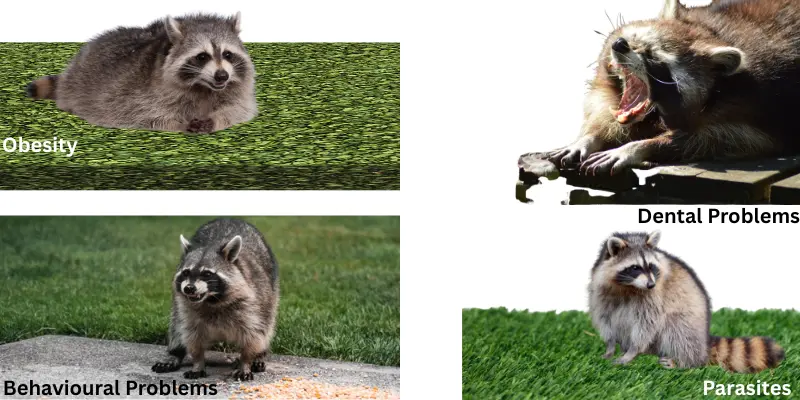Pet Raccoons For Sale – Training, Health Problems And Feed
Published: 13 May 2025
Pet raccoons for sale are becoming increasingly popular due to their playful and intelligent nature. However, owning a raccoon requires more responsibility than traditional pets like dogs or cats. It’s essential to understand their needs, legal requirements, and proper care before making a decision.
Table of Contents
How To Find Pet Raccoons For Sale
Finding a pet raccoon should be done with caution. Always choose licensed and reputable breeders who prioritize animal welfare. Avoid sketchy online sellers or those who pressure you into a quick sale.

Additionally, wildlife rescue centres sometimes have raccoons available for adoption. Always confirm the animal’s health and legality before purchasing.
Are Raccoons Legal as Pets in Your Area?
Before buying a pet raccoon, check local and state laws. Some regions strictly ban raccoons as pets, while others require a special permit. Owning a raccoon illegally can lead to hefty fines or confiscation.
If you get a raccoon without following the rules, you can face big problems, like paying fines or losing your pet. Always check your local laws first. You can call your city office or visit their website to get the right information.
How to Choose a Healthy Baby Raccoon
- Eyes: Bright, clear, and free from discharge.
- Fur: Thick, shiny, and clean. No bald spots.
- Weight: Should not be underweight or obese.
- Behaviour: Energetic, curious, and playful.
- Parental Health: Ask about the health of the parents.
- Avoid: Coughing, sneezing, or signs of weakness.
What to Feed a Pet Raccoon
A balanced raccoon diet includes:
- Fresh fruits and vegetables
- Cooked eggs and lean meat
- Nuts (in moderation)
- High-quality commercial raccoon food
How to Train Your Raccoon
Training a raccoon is possible but requires patience and consistency. Start with simple commands like “sit” or “come.” Use treats like nuts or fruits as rewards.
Training Tips
- Keep sessions short and engaging.
- Use positive reinforcement, not punishment.
- Provide mental stimulation with toys and puzzles.
- Stay consistent because raccoons can test boundaries
Common Health Problems In Pet Raccoons
Pet raccoons can face common health problems such as obesity, parasites, dental issues, respiratory infections, and kidney disease, requiring regular veterinary care.

1. Obesity
Raccoons can easily become overweight if not given proper exercise and a balanced diet. Obesity can lead to other health issues like diabetes and joint problems.
2. Parasites
Raccoons are prone to parasites like fleas, ticks, and worms. Regular vet check ups and proper treatments are necessary to keep them healthy.
3. Dental Problems
Raccoons can suffer from tooth decay or gum disease, especially if they are fed sugary or improper foods. Regular dental care is important.
4. Upper Respiratory Infections
Pet raccoons can catch respiratory infections, especially if they are exposed to cold or damp environments. Symptoms include sneezing and coughing.
5. Kidney Disease
Raccoons can develop kidney issues, particularly if they are not given enough water or their diet lacks essential nutrients.
6. Behavioural Problems
While not always a physical health issue, behavioural problems such as aggression or anxiety can arise due to poor care or lack of socialization.
7. Infections from Bites or Scratches
Raccoons’ sharp teeth and claws can cause infections if they bite or scratch you, especially if the wound isn’t cleaned properly.
Advantages and Disadvantages of Pet Raccoon For Sale
Pet raccoons are fun and unique, but they come with both benefits and challenges. Let’s explore the advantages and disadvantages of having one as a pet.
| Pros |
|---|
|
| Cons |
|---|
|
FAQs About Pet Raccoons for Sale
“Have questions about pet raccoons? Check out these common FAQs to learn everything you need to know before getting a pet raccoon for sale.”
Yes, raccoons can be friendly, but they are also very curious and naughty. They need a lot of attention and care to become well-behaved.
Raccoons need space to roam and explore. Keeping them in an apartment can be difficult because they need a safe area to play.
Raccoons can live up to 15-20 years in captivity if taken care of properly.
They enjoy fruits, vegetables, nuts, and cooked meat. Always avoid giving them junk food like candy or chocolate.
Yes, raccoons require regular vet check ups and vaccinations, especially because they are wild animals with unique needs.
Training a raccoon is challenging. They are smart but can be stubborn. Consistency and patience are key when training them.
It depends on where you live. Some areas allow them, but others have strict laws or bans. Always check local laws before getting a raccoon.
Conclusion
Pet raccoons can be amazing companions if you’re ready for the responsibility. They are playful, curious, and unique, making them fun to have around. However, owning a raccoon comes with its challenges, like their tricky behaviour and special care needs. It’s important to check if raccoons are legal in your area and ensure you have the time and resources to properly care for them. If you decide to get a pet raccoon, be prepared for a fun, yet demanding experience.
Article by Pets Osrs

- Be Respectful
- Stay Relevant
- Stay Positive
- True Feedback
- Encourage Discussion
- Avoid Spamming
- No Fake News
- Don't Copy-Paste
- No Personal Attacks

- Be Respectful
- Stay Relevant
- Stay Positive
- True Feedback
- Encourage Discussion
- Avoid Spamming
- No Fake News
- Don't Copy-Paste
- No Personal Attacks





